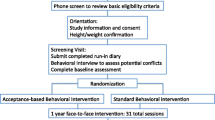Abstract
Overemphasis of only conditioning factors in behavior modification may narrow treatment applicability. A case of severe dysphoria and restriction in living, which had resisted conventional psychoand chemo-therapies, is presented. Successful treatment was accomplished by broad-spectrum methods combining social-influence, cognitive restructuring, and specific goal-setting with counter-conditioning procedures. A strategy for intervention in self-perpetuating vicious cycles is exemplified, and non-learning aspects of behavior modification techniques are discussed.
Similar content being viewed by others
References
Bandura, A.: Modelling approaches to the modification of phobic disorders.In Ciba Foundation Symposium on the Role of Learning in Psychotherapy, Porter, R. (ed.). London, J. & A. Churchill, 1968.
—: Principles of behavior modification. New York, Holt, Rinehart and Winston, 1969.
Cook, S., and Harris, R.: The verbal conditioning of the GSR.J. Exp. Psychol.,21: 202–210, 1937.
Lazarus, A. A.: Broad-spectrum behavior therapy and the treatment of agoraphobia.Behav. Res. & Ther.,4: 95–97, 1966.
—: Learning theory and the treatment of depression.Behav. Res. & Ther.,6: 83–89, 1968.
Martin, M., Burkholder, R., Rosenthal, T. L., Tharp, R. C., and Thome, G. L.: Programming behavior change and réintégration into school milieux of extreme adolescent deviates.Behav. Res. & Ther.,6: 371–384, 1968.
Rosenthal, T. L.: Severe stuttering and maladjustment treated by desensitization and solical influence.Behao. Res. & Ther.,6: 125–130, 1968.
Salter, A.: Conditioned Reflex Therapy. London, Allen & Unwin, 1952.
Skinner, B. F.: Science and Human Behavior. New York, Appleton Century-Crofts, 1953.
Wolpe, J.: Psychotherapy by Reciprocal Inhibition. Stanford, Calif., Stanford Univ. Press, 1958.
Author information
Authors and Affiliations
Additional information
This research was supported by U.S.P.H. post-doctoral fellowship IF3MH-31, 385-01, at the Institute of Psychiatry, University of London. The first author conducted treatment under the supervision of the second author, who made the follow-up contacts. We wish to express appreciation to Dr. Edward S. Chesser, who referred the patient for treatment and helped in other matters, and to the staff of the Academic Department of Psychiatry, Middlesex Hospital, for their cooperation in diverse ways.
Rights and permissions
About this article
Cite this article
Rosenthal, T.L., Meyer, V. Case report: Behavioral treatment of clinical abulia. Conditional Reflex 6, 22–29 (1971). https://doi.org/10.1007/BF03000263
Issue Date:
DOI: https://doi.org/10.1007/BF03000263




